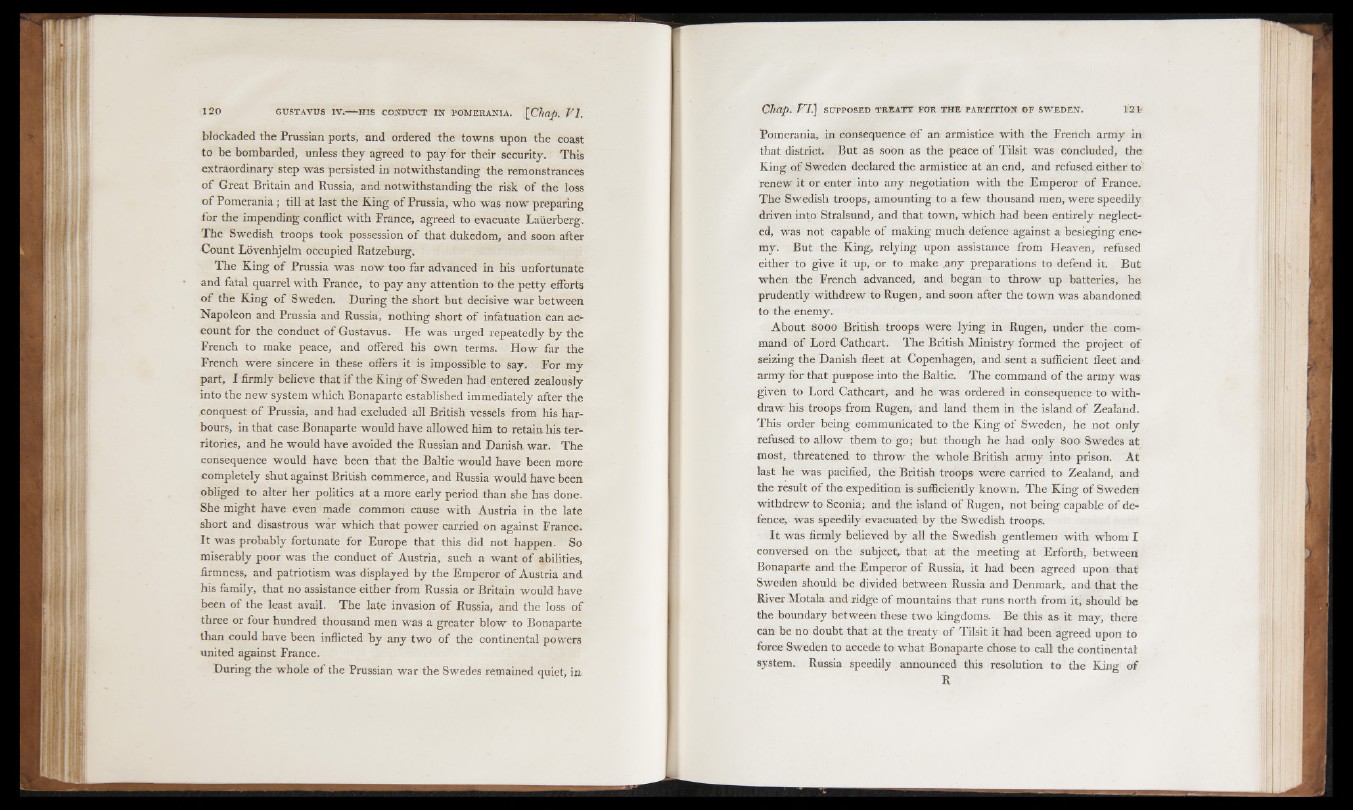
blockaded the Prussian ports, and ordered the towns upon the coast
to be bombarded, unless they agreed to pay for their security. This
extraordinary step was persisted in notwithstanding the remonstrances
o f Great Britain and Russia, and notwithstanding the risk of the loss
o f Pomerania; till at last the King o f Prussia, who was now preparing
for the impending conflict with France, agreed to evacuate Lauerberg.
The Swedish troops took possession o f that dukedom, and soon after
Count Lovenhjelm occupied Ratzeburg.
The King o f Prussia was now too far advanced in his unfortunate
and fatal quarrel with France, to pay any attention to the petty efforts
o f the King o f Sweden. During the short but decisive war between
Napoleon and Prussia and Russia, nothing short o f infatuation can account
for the conduct o f Gustavus. He was urged repeatedly by the
French to make peace, and offered his own terms. How far the
French were sincere in these offers it is impossible to say. For my
part, I firmly believe that i f the King of Sweden had entered zealously
into the new system which Bonaparte established immediately after the
conquest o f Prussia, and had excluded all British vessels from his harbours,
in that case Bonaparte would have allowed him to retain his territories,
and he would have avoided the Russian and Danish war. The
consequence would have been that the Baltic would have been more
completely shut against British commerce, and Russia would have been
obliged to alter her politics at a more early period than she has done.
She might have even made common cause with Austria in the late
short and disastrous war which that power carried on against France.
It was probably fortunate for Europe that this did not happen. So
miserably poor was the conduct of Austria, such a want o f abilities,
firmness, and patriotism was displayed by the Emperor of Austria and
his family, that no assistance either from Russia or Britain would have
been of the least avail. The late invasion o f Russia, and the loss of
three or four hundred thousand men was a greater blow to Bonaparte
than could have been inflicted by any two o f the continental powers
united against France.
During the whole of the Prussian war the Swedes remained quiet, in.
Pomerania, in consequence of an armistice with the French army in
that district. But as soon as the peace o f Tilsit was concluded, the
King of Sweden declared the armistice at an end, and refused either to
renew it or enter into any negotiation with the Emperor of France.
The Swedish troops, amounting to a few thousand men, were speedily
driven into Stralsund, and that town, which had been entirely neglected,
was not capable o f making much defence against a besieging enemy.
But the King, relying upon assistance from Heaven, refused
either to give it up, or to make .any preparations to defend it. But
when the French advanced, and began to throw up batteries, he
prudently withdrew to Rugen, and soon after the town was abandoned
to the enemy.
About 8000 British troops were lying in Rugen, under the command
of Lord Cathcart. The British Ministry formed the project of
seizing the Danish fleet at Copenhagen, and sent a sufficient fleet and
army for that purpose into the Baltic. The command of the army was
given to Lord Cathcart, and he was ordered in consequence to withdraw
his troops from Rugen, and land them in the island of Zealand.
This order being communicated to the King o f Sweden, he not only
refused to allow them to go; but though he had only 800 Swedes at
most, threatened to throw the whole British army into prison. At
last he was pacified, the British troops were carried to Zealand, and
the result o f the expedition is sufficiently known. The King of Sweden
withdrew to Sconia; and the island of Rugen, not being capable of defence,
was speedily evacuated by the Swedish troops.
It was firmly believed by all the Swedish gentlemen with whom I
conversed on the subject, that at the meeting at Erforth, between
Bonaparte and the Emperor of Russia, it had been agreed upon that
Sweden should be divided between Russia and Denmark, and that the
River Motala and ridge of mountains that runs north from it, should be
the boundary between these two kingdoms. Be this as it may, there
can be no doubt that at the treaty o f Tilsit it had been agreed upon to
force Sweden to accede to what Bonaparte chose to call the continental
system. Russia speedily announced this resolution to the King of
R